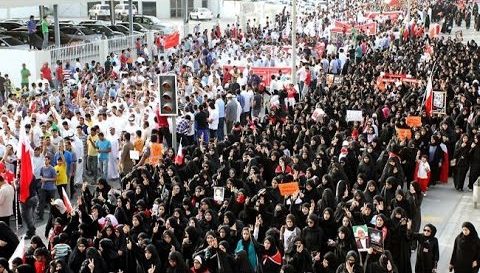AhlulBayt News Agency - Salam Organization called upon the international community and its institutions to carry out their legal, moral, and humanitarian responsibilities,
London-based Human Rights organization, Salam, stated in a report that the Bahraini authorities continue their campaign to target the town of Diraz, which is the stronghold of the Shiite leader Ayatollah Sheikh Isa Qassim; the most prominent religious scholar in the country. This campaign was launched since Sheikh Isa's nationality was revoked last June.
Salam Organization for Democracy and Human Rights said in a report entitled "The siege of Diraz: Political Revenge, a Tool for Sectarian Persecution", that "on June 20, 2016, the Bahraini authorities proceeded to revoke Ayatollah Sheikh Isa Ahmad Qassim's Nationality (...). The siege of Diraz was a step taken by the authorities after Shiite clerics, political activists, and social workers called for holding peaceful sit-ins in front of his [Sheikh Isa's] house".
"Clearly, the goal of the siege is an attempt by the authorities to punish citizens, contain the protesters in Diraz, and prevent the citizens from joining the demonstrators, since the authorities do not want to recreate the Pearl Roundabout scene," the report added.
"All roads leading to Diraz have been closed; and they are 9 main entrances, in addition to all the secondary and unpaved driveways, which are estimated to be around 16 entrances. Piles of sand were placed at secondary entrances and open spaces. Meanwhile, there was an increase of barbed wires around the town, installed together with barriers," it further stated.
Salam also stressed in its report that "Barbed wires have been installed near Sheikh Darwish Mosque. In addition, security checkpoints remained in action at the 9 main entrances to prevent the entry of vehicles, which was only allowed through two entrances (Barbar, and the road leading to the northern city from the West".
"The security authorities deployed civilian militias, accompanied by mercenaries (police members of non-Bahraini nationalities), and female police at the only 2 open entrances. These members were equipped by very efficient lighting equipment", noted the report.
Based on the statement of an eyewitness, the Salam report clarified, that "the security checkpoints are military barracks heavily equipped by armors and vehicles to [combat] riots. There number is not less than 3 vehicles and 1 armor for each compound, while the number of security individuals is around 18 to 22 individual; most of which are often foreigners and do not speak Arabic."
"Security authorities deployed also two unmanned drones in the skies of the besieged town, intensively, in order to monitor the movements of citizens and demonstrators, while another army helicopter swarmed the sky", Salam added in its report.
The report further mentioned how the residents of Diraz are complaining about a number of parking tickets that are registered against cars parked in open spaces near the Budaiya street, in spite of not violating the traffic law.
The report carried on to say that many citizens were "prevented from entering the town of Diraz to visit their parents and their relatives on Eid al-Fitr".
Salam Organization called upon the international community and its institutions to carry out their legal, moral, and humanitarian responsibilities, and "stop the Bahraini authorities' disregard for international law and the UN Charter of Human Rights, and force them to break the siege over Diraz immediately".
In this context, Salam stressed on "the responsibility to put pressure on the authorities in Bahrain by all legitimate means, to undo the decisions made to revoke the nationality of Ayatollah Qassem, and close down the Tawiya, Risala, al-Wefaq socities and the rest of the civil society institutions".
/129

